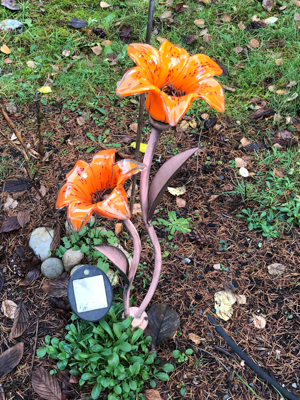Recently my husband caught me off guard when he asked, “What does “discipline equals X” make you think of?” I replied with the very first thought that came to mind: “Ball and chain.” I never expected him to insert the word “Freedom” for X. Turns out Jocko Willink wrote a book called Discipline Equals Freedom. I haven’t read it yet. This post is based solely on the title, with some help from Chat GPT 4. But it raises a blog-worthy question: How do you view discipline? And what’s your relationship with it? Let’s take a closer look at what discipline equals.

Wrapping My Head Around Discipline Equals Freedom
As soon as I finished talking with my husband, I did four things. First, I reserved the book from the library and added it to my growing “Want to read in 2024” pile.
Second, I took a long color walk with my dog around the neighborhood. My daughter suggested I look for the color orange, so I’ve included some of my shots from that walk.

Third, I looked up the definition of discipline: roughly, discipline means “doing what needs to be done, even if you don’t want to do it.” Hence my “ball and chain” quip.
Finally, I enlisted Chat GPT’s help to summarize the highlights of Willink’s book. I wanted to see how many of them I’m already doing consistently and what skillset I may still need to develop.
Discipline Equals Freedom: Chat GPT Summary
Here are Willink’s top six points with my reactions to each:
Discipline Is the Path to Freedom
- Willink argues that discipline is the key to achieving freedom in all aspects of life. This means consistently following a set of principles and habits that lead to self-improvement and goal attainment.
- My biggest fixed mindset issue around this is I used to think that “personal development” meant there was something inherently “broken” or “wrong” about me. Now I can see that if we stop trying to reach goals or improve something in our lives, we’re on our way to the grave. A growth mindset shift.
Wake Up Early
- Willink believes that waking up before dawn is a foundational habit that sets the tone for a disciplined day. It’s about taking control of your schedule and maximizing productivity.
- Check. For nearly four decades I’ve been a morning person, getting my most productive work — or workouts — in before anything else. If I don’t, I’ll be cranky the rest of the day.

Prioritize and Execute
- Willink advises to prioritize the most important tasks and focus on executing them well. This approach helps in managing stress and being effective in both personal and professional life.
- This is one area I could improve. It is also not new to me. Stephen Covey addresses something similar in his bestselling book, the 7 Habits of Highly Effective People.
Physical Fitness
- In Discipline Equals Freedom, Willink asserts that rigorous exercise not only strengthens the body but also builds mental toughness and discipline. He emphasizes consistency and pushing beyond comfort zones.
- Check. Frequent physical activity has been one of my pillars of health and well-being since high school and provides emotional satisfaction, enhanced sleep, joint lubrication, weight management, personal challenge, and the ability to do all the things I want to do without pain or injury.

Detachment for Better Decision-Making
- Willink recommends maintaining an emotional detachment when making decisions. This detachment allows for clearer thinking and better decision-making, especially in high-pressure situations.
- Ooh boy. This reminds me of “Care less about an issue than your clients,” a behind-the-scenes tip Precision Nutrition coaches are taught when facing client resistance or emotionally charged topics. If we care more about a client’s successes or failures than they do, it’s a recipe for disaster for the highly sensitive coach.
Ownership of Mistakes
- Willink emphasizes the importance of taking full responsibility for one’s actions and their outcomes, including mistakes. This mindset fosters growth, learning, and improvement.
- This leads perfectly to where I’m headed in 2024. I want to cultivate a growth mindset in all areas, particularly around technology, communication, and spirituality, not just where I already have it in writing, training, and physical fitness.

Implementing for Change
So, what is the takeaway for you? You are here because you want something. And you want to get it with as little struggle or effort as possible. Maybe you’re looking for knowledge. Perhaps you want to change something. Or it could be that you’re following this blog to glean whatever nuggets you can. In Discipline Equals Freedom, Willink asserts that we need to delay instant gratification and be adults today so we gain freedom tomorrow.
Sometimes we need to do hard things, consistently, to get a payoff. If change were easy, we’d all be exactly where we want to be. We want the new job. The successful summit. A higher paycheck. Annual vacations. Stronger relationships. Fitter physique. A significant other.

Discipline In My Life
Discipline requires ongoing effort. It took me nine years to publish my first book. I needed seven years to finally start my blog. And I put off shooting a one-minute video for my new health and wellness company. for nearly ten months. It doesn’t mean I was working steadily during all that time. Enter our friend, procrastination.
In each case, it would have been far less stressful if I’d just had the discipline to do the thing, rather than put it off indefinitely. But the payoff is this: by putting in the time, you get the results. The only way NOT to get them is to never even try or to quit when things get hard.
What are you putting off? What commitment would you like to make for 2024? Who can you share it with, in writing, so that you are more likely to follow through? Who can you tell, out loud, so that the world hears your intention — and so do you?


Jack Willink is a former navy seal, so he came from a field where discipline is required to succeed. Over the years, I listened to a few of his podcasts, which can be over 3-hour long.
Discipline requires continuous effort. Today people want to do things as quickly as possible (like 5- minute strength training) effortlessly and want “instant” gratification.
Discipline = freedom, yes & it is not always fun to do the work but if you do the work consistently, you feel alive & joyful. I am not using happiness anymore… I prefer alive.
I am an urge fan of DISCIPLINE & my projects take a long time to achieve.
I believe there are many different ways to achieve discipline & you don’t need to be a morning person to do it. We are all different.
Continued effort & accountability to yourself is important. You may need a coach or mentor to do it. There are many different ways to achieve it.
Never give up…something I stop using…give up when it is right to give up…it is you call and you know what feels right.
Thank you Courtenay for this article. Discipline is an interesting topic. Love it.
Very well put, Silvie Marie. And your comment, “Not using happiness anymore … prefer alive” stood out — by doing those things that make us feel more alive, we can experience more flow, joy, and ultimately contentment. Right you are about wanting instant gratification; that’s why sugar, gambling, shopping, and anything we probably need to curtail are so popular, they give us a dopamine hit whereas the joy that comes from projects involving discipline delay that dopamine hit. But oh, the payoffs.
To your comment about “you don’t need to be a morning person” is a curious one — I think Willink’s point is about doing the first things first, the most important ones, the things you need some discipline to tackle, whether your “morning” starts at 4 a.m. or 9 a.m. My husband is one of the most disciplined people I know and he stays up until midnight most days.
Finally, I love your point “give up when it is right to give up” — spot on. Tama Kieves talks about handing over trust to Spirit (whatever that looks like for you) and asks us to see things differently. If we look at discipline as a “ball and chain” and instant gratification as the only way to live, can we ask to see these “stories” in a new way? Case in point, sometimes I feel like I’ve “given up” on writing children’s books, but perhaps the break and shift to blog and client writing is giving me more energy to return to it, better and stronger than ever, when the flow and time are right.
So, what’s your obstacle? Where do you want to shift? If it requires discipline, how might you start with 5-10 minutes a day and build that discipline skill or muscle, just like you might your abs or heart or biceps?
Thanks for the great comment! Happy holidays.